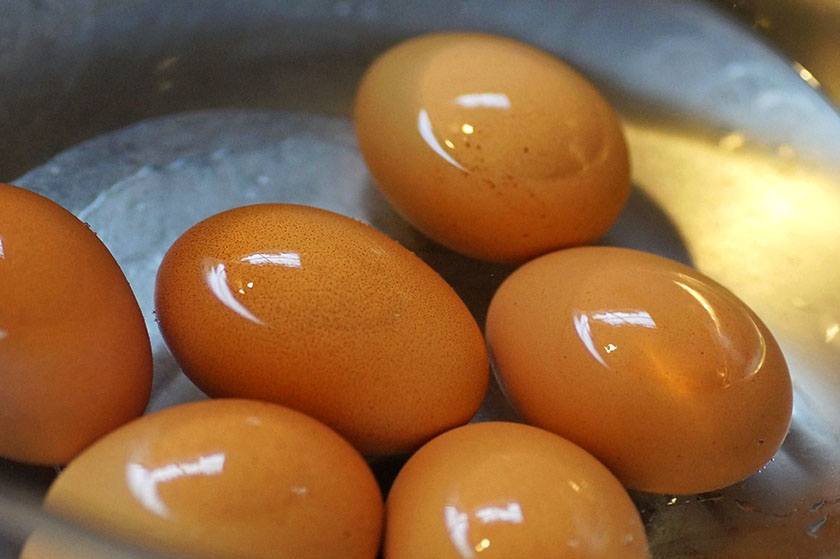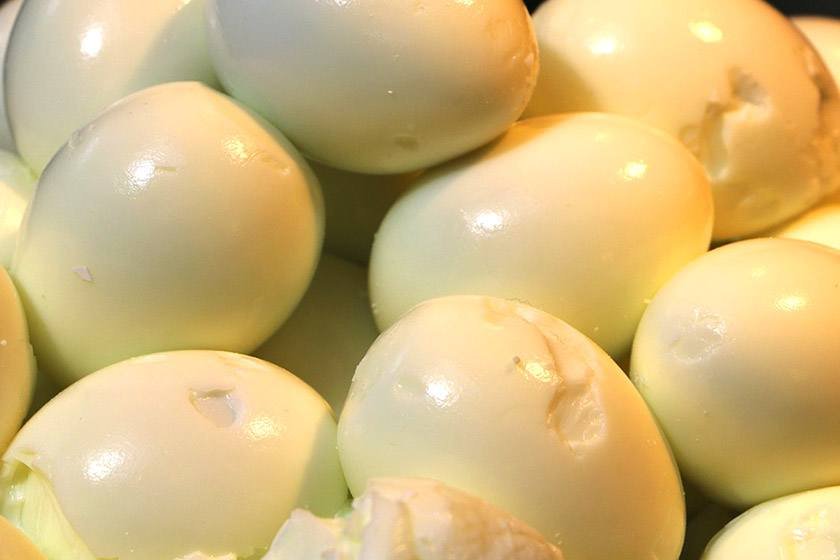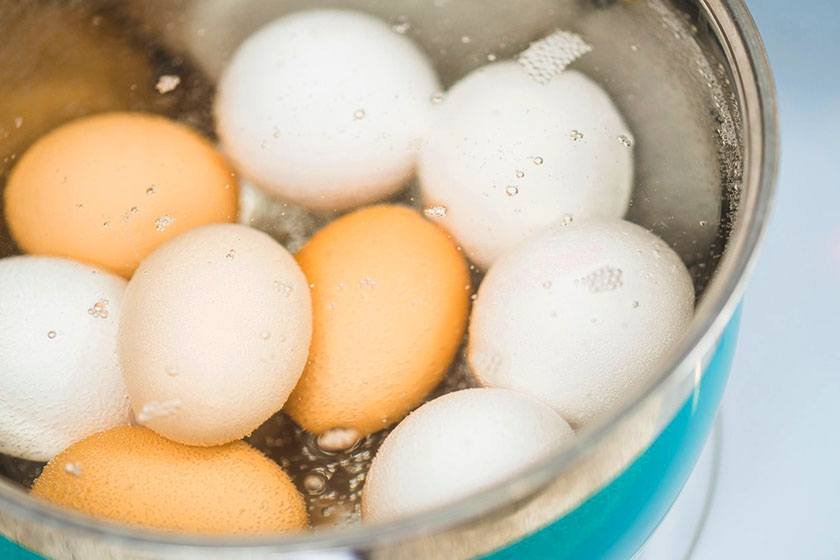Mastering the best way to hard boil fresh eggs may seem simple, but perfecting this technique can greatly improve your overall cooking skills.
This guide will provide an overview of fresh eggs and the proper cooking methods for achieving perfect hard boiling. It will cover optimal boiling times for various textures, offer tips for easy peeling, and outline the best storage practices to maintain the freshness of hard-boiled eggs.
Whether one is a novice or an experienced cook, this resource is designed to improve overall egg-cooking proficiency and egg preparation skills.
How to Hard Boil Fresh Eggs?
Hard boiling fresh eggs is a fundamental cooking technique and a classic cooking method that facilitates their incorporation into a variety of dishes, ranging from salads to breakfast options. This method not only promotes food safety but also optimizes the nutritional benefits of eggs, particularly their high protein content.
Whether one prefers soft-boiled or hard-boiled eggs, comprehending the ideal boiling time, water temperature, and cooling methods, such as using an egg timer, is essential for enhancing the egg cooking experience. By adhering to appropriate procedures, individuals can achieve consistently perfect boiled eggs, establishing them as a staple in their culinary repertoire.
What Are Fresh Eggs?
Fresh eggs are those collected within a few days of being laid, ensuring optimal flavor and texture in culinary applications. The freshness of an egg can often be assessed by examining its color, size, and the durability of its shell, as well as its egg grade.
One widely recognized method for evaluating freshness is the water test. In this procedure, an egg is placed in a bowl of water. A fresh egg will sink and lay flat on the bottom, while an egg that stands upright or floats should be discarded. This test is essential for assessing egg freshness.
It is also important to inspect the shell for any cracks or a powdery residue, as these may indicate deteriorating quality. The best way to hard boil fresh eggs starts with proper storage.
To maintain their integrity, eggs should be kept in their original carton in the coldest part of the refrigerator, which helps prevent moisture and odors from compromising their condition, ensuring they stay fresh for boiling.
Proper handling is crucial – therefore, it is essential to wash hands thoroughly after handling raw eggs to minimize the risk of contamination and maintain food safety.
How to Prepare Fresh Eggs for Hard Boiling?
 Preparing fresh eggs for hard boiling is crucial to achieving the desired texture and flavor, and it begins with selecting appropriate kitchen tools.
Preparing fresh eggs for hard boiling is crucial to achieving the desired texture and flavor, and it begins with selecting appropriate kitchen tools.
One should utilize a pot with a lid that can comfortably accommodate the number of eggs, ensuring they are fully submerged in water. Additionally, a quality egg boiling thermometer can assist in monitoring the boiling temperature, thereby contributing to the optimal cooking of the eggs.
In conjunction with the pot and thermometer, a slotted spoon is critical for the efficient retrieval of eggs once cooking is complete. When preparing the water, it is advisable to start with cold, filtered water to ensure even heating – this practice helps prevent cracks in the shells and avoids cracked eggs.
Once the eggs are placed in the boiling water, maintaining a controlled temperature is critical. A gentle rolling boil is recommended, as it ensures that both the egg whites and yolks cook evenly. Timing is also a significant factor, typically ranging from 9 to 12 minutes, depending on the preferred firmness of the yolks and cooking time preferences.
After boiling, it is essential to immediately submerge the eggs in an ice bath to halt the cooking process and facilitate easier peeling. This cooling process helps in achieving perfectly peeled eggs.
What Is the Best Way to Hard Boil Fresh Eggs?
The best way to hard boil fresh eggs involves a precise cooking process and careful attention to detail, which together ensure achieving a perfectly creamy yolk and firm egg white.
One should begin by bringing a pot of water to a gentle simmer or low heat before carefully adding the eggs in their shells. Covering the pot allows for the eggs to cook for the appropriate duration, which is essential for achieving perfect hard-boiled results.
Various techniques can enhance both the flavor and ease of peeling, thereby improving the overall enjoyment of the eggs. For example, some culinary experts advocate for the addition of a generous pinch of salt to the water to improve the water ratio, as this can help solidify any egg whites that escape through cracks. Others recommend using vinegar to prevent the shells from adhering to the egg white.
Timing is of utmost importance – a typical boiling period of 9 to 12 minutes may yield results that vary based on the size and freshness of the eggs.
Upon completion of the cooking time, it is advisable to plunge the eggs into an ice bath to halt the cooking process, facilitating easier peeling. This shocking technique ensures that the hard-boiled eggs remain tender yet manageable, avoiding overcooked eggs.
How Long Should Fresh Eggs Be Boiled?
Determining the appropriate boiling time for fresh eggs is essential for achieving the desired level of doneness, whether one prefers soft-boiled or hard-boiled eggs. The cooking duration may vary depending on the size of the eggs and the boiling temperature, both of which directly affect the interior consistency of the egg. High heat may result in different textures than using lower heat settings.
A comprehensive understanding of these factors can substantially enhance the overall cooking experience.
What Is the Perfect Boiling Time for Soft Boiled Fresh Eggs?
The optimal boiling time for soft-boiled fresh eggs generally ranges from 4 to 6 minutes, depending on the size of the eggs and the desired consistency of the egg yolk. Soft-boiled eggs provide a creamy yolk that complements toast or salads, resulting in a delightful culinary experience.
In pursuit of the ideal soft-boiled egg, it is important to consider that medium-sized eggs typically require approximately 5 minutes to achieve a silky, slightly runny yolk, while large eggs may necessitate a full 6 minutes to reach that desirable, melt-in-your-mouth texture. Conversely, smaller eggs can be cooked in just 4 minutes.
This variation in cooking time enables a customizable dining experience – one might enjoy these eggs over a fresh arugula salad or with a sprinkle of sea salt and fresh herbs for enhanced flavor.
Serving them alongside crispy soldiers or buttery brioche enhances the overall experience, making it an exquisite addition to any meal. The best way to hard boil fresh eggs ensures they turn out perfectly every time, complementing the delicious accompaniments.
What Is the Perfect Boiling Time for Hard Boiled Fresh Eggs?
For hard-boiled fresh eggs, the optimal boiling time typically ranges from 9 to 12 minutes, which results in a fully cooked egg white and a firm yolk. This duration can be modified according to individual preferences and the desired consistency of the yolk, highlighting the versatility of this traditional dish. Tools like a cooking time calculator can assist in achieving desired results.
It is important to note that variations in egg size can significantly affect the final result. Larger eggs may require a few additional minutes, while smaller eggs might be ready in as little as 7 or 8 minutes. Medium eggs typically fall in between, requiring careful timing adjustments.
The boiling method employed is also critical – for example, starting eggs in cold water and gradually bringing them to a boil can produce different textures compared to placing them directly into boiling water. Other methods like the steam method or using a pressure cooker can offer alternative results.
Regardless of whether one chooses a gentle simmer or a rapid boil, meticulously monitoring the boiling time is essential to ensure that the eggs are cooked to perfection, tailored to individual taste preferences.
How to Check If Fresh Eggs Are Hard Boiled?
To determine whether eggs are hard-boiled, one effective method involves gently spinning the egg on a flat surface. If the egg spins smoothly, it is likely fully cooked. Alternatively, one may crack an egg open and visually assess the consistency of the yolk and white to confirm that they are fully set. An egg shell with a matte finish also indicates hard-cooked eggs.
Along with these techniques, a simple water test can also be performed. The best way to hard boil fresh eggs involves a simple test: submerge the egg in a bowl of water. If the egg sinks and rests flat on the bottom, it is perfectly hard-boiled. However, if the egg floats, it’s a sign that the egg is still raw. This method is a reliable indicator of egg cooking completion.
Another useful indicator is the appearance of the eggshell – a hard-boiled egg typically exhibits a more matte finish compared to the glossy surface of a fresh egg. Additionally, many individuals utilize the “bounce test”, in which a hard-boiled egg lightly bounces on a surface, demonstrating its solid interior.
How to Peel Hard Boiled Fresh Eggs?
 Peeling hard-boiled eggs can occasionally present challenges – however, utilizing the appropriate techniques can greatly streamline the process. Employing kitchen hacks like using a steam basket or egg cooker can further ease the egg peel.
Peeling hard-boiled eggs can occasionally present challenges – however, utilizing the appropriate techniques can greatly streamline the process. Employing kitchen hacks like using a steam basket or egg cooker can further ease the egg peel.
Following the boiling procedure, employing an effective cooling method, such as an ice bath, can facilitate easier peeling by allowing the egg to contract slightly, thereby making the shell more manageable to remove. This is a crucial step in the egg boiling process.
What Is the Easiest Way to Peel Hard Boiled Fresh Eggs?
The most efficient method for peeling hard-boiled eggs involves gently tapping the egg on a hard surface to create cracks in the shell, followed by rolling the egg to further loosen the shell. This technique minimizes the risk of damaging the egg white and enhances the overall peeling experience. Incorporating culinary tips can ensure flawless results every time.
Incorporating effective peeling techniques and understanding the best way to hard boil fresh eggs is crucial for both the quality of the final dish and adherence to food safety practices.
By simplifying the peeling process, cooks can prevent cross-contamination, ensuring that the shell does not come into contact with the edible portions.
Utilizing clean surfaces and utensils while handling eggs significantly reduces the risk of introducing harmful bacteria and ensures proper management of egg whites and egg yolk.
Proper egg handling methods, combined with efficient peeling techniques, contribute to a safer kitchen environment, enabling culinary enthusiasts to enjoy their creations while maintaining high health standards. It’s important to consider the cooking time for hard-boiled eggs to achieve the desired consistency.
What Are Some Tips for Easier Egg Peeling and Egg Preparation?
To facilitate the peeling of hard-boiled eggs, it is advisable to utilize older eggs, as they generally peel more easily than fresh ones. Implementing certain kitchen techniques, such as adding vinegar or salt to the boiling water, can assist in creating steam, which in turn helps to loosen the shell during the cooking process. Using an egg timer can ensure accurate cooking time and prevent overcooked eggs.
Along with these preliminary recommendations, rapidly cooling the eggs in an ice bath immediately after boiling can also simplify shell removal.
The best way to hard boil fresh eggs involves a process that not only halts the cooking but also encourages the egg white to contract, creating a gap between the egg and its shell. Additionally, using a steam method can assist in loosening the egg shell for easier peeling.
For individuals who frequently peel multiple eggs, investing in a specialized egg peeler may enhance efficiency in this task. By gently tapping the egg on a hard surface to crack the shell and then rolling it between one’s hands to further loosen the shell, the entire peeling process can become markedly more streamlined.
Additionally, understanding the cooking time and using a cooking time calculator can help in optimizing the texture of both the egg whites and egg yolk.
How to Store Hard-Boiled Fresh Eggs for Optimum Egg Freshness?
Proper storage of hard-boiled fresh eggs is crucial for maintaining their freshness and ensuring food safety. Ideally, these eggs should be kept in the refrigerator inside a sealed container to prevent contamination and extend their shelf life. The egg storage method plays a significant role in maintaining the nutrients and flavor.
This method allows for convenient use in salads or breakfast preparations as desired. Consider adding them to egg salad or as a salad topping for a family meal.
What Is the Best Way to Store Hard-Boiled Fresh Eggs for Extended Shelf Life?
 The optimal method for storing hard-boiled fresh eggs is to keep them in their shells within a covered container in the refrigerator. This approach effectively minimizes moisture loss and protects the eggs from absorbing odors from other foods, thereby preserving their flavor and quality.
The optimal method for storing hard-boiled fresh eggs is to keep them in their shells within a covered container in the refrigerator. This approach effectively minimizes moisture loss and protects the eggs from absorbing odors from other foods, thereby preserving their flavor and quality.
Along with enhancing taste, this storage technique is vital for food safety, as it reduces the risk of bacterial contamination. Refrigeration significantly inhibits the growth of potential microorganisms, thereby extending the shelf life of the eggs and ensuring they remain safe for consumption.
Maintaining the eggs in their shells not only protects the delicate egg whites and yolks but also preserves essential nutrients. By adhering to proper storage methods, individuals can enjoy the advantages of fresh-tasting eggs while minimizing food waste, making this practice essential for anyone aiming to maintain a healthy kitchen and encourage healthy eating.
How Long Can Hard-Boiled Fresh Eggs Be Stored for Optimum Food Safety?
The best way to hard boil fresh eggs involves a process that not only halts the cooking but also encourages the egg white to contract, creating a gap between the egg and its shell. Additionally, using a steam method can assist in loosening the egg shell for easier peeling. Ensuring proper storage conditions is essential for maintaining their safety and quality during this period.
The temperature of the refrigerator is critical – eggs should be stored at or below 40°F (4°C) to prevent spoilage. Additionally, the method of cooling the eggs after boiling significantly impacts their shelf life. It is recommended to immerse the eggs in ice water immediately after boiling to halt the cooking process, thereby preserving their texture and flavor. Using an egg cooker can streamline the whole cooking process.
Furthermore, it is advisable to keep the eggs in their shells until consumption, as the shells provide a natural protective barrier against bacteria. Understanding egg freshness is key in determining the right time for meal prep and meal ideas.
By adhering to these guidelines, individuals can enjoy these nutritious snacks while minimizing the risk of foodborne illness.
What Are the Safety Precautions for Storing Hard-Boiled Fresh Eggs and Maintaining Egg Freshness?
When storing hard-boiled fresh eggs, it is imperative to adhere to specific safety precautions to prevent foodborne illnesses. It is essential to ensure that the eggs are cooled adequately after boiling, and they should be stored in a clean, sealed container within the refrigerator to maintain optimal freshness.
Proper cooling methods are vital – eggs should ideally be submerged in cold water or placed under cold running water immediately after cooking to rapidly reduce their temperature. This approach not only enhances safety but also ensures improved texture.
Maintaining cleanliness is equally crucial. Any cooking utensils or containers used during the cooking and storage processes must be thoroughly washed. It is advisable to label the container with the date of boiling, as hard-boiled eggs are best consumed within one week.
By following these food safety practices, individuals can confidently enjoy their hard-boiled eggs without concerns regarding spoilage or contamination, especially when using the best way to hard boil fresh eggs for optimal results. This ensures a healthy kitchen and aligns with principles of food science.
Explore our FAQ section below for more support.

